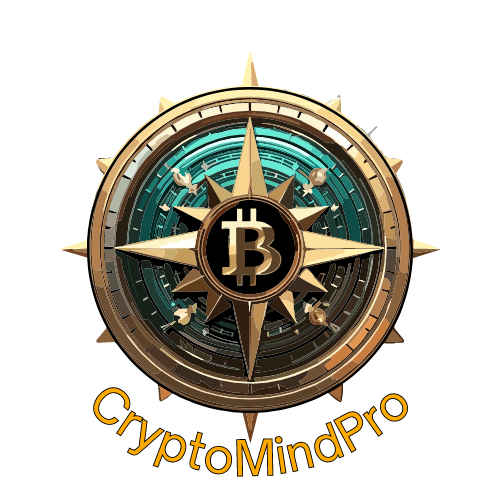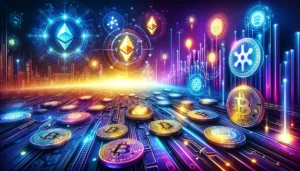In the realm of decentralized finance (DeFi), DeFi governance tokens play a crucial role.
They are more than just digital assets; they represent a form of shared control over the protocols.
With these tokens, individuals collectively make decisions, influence changes, and drive the evolution of the DeFi platforms they are part of.
Entering the world of DeFi governance tokens is stepping into a new era of financial autonomy and community-driven innovation.
Key Takeaways
Aspect Insight Definition Governance tokens are cryptographic assets enabling holders to participate in protocol governance, fostering decentralization within the DeFi space. Significance They decentralize decision-making, aligning protocol evolution with community interests. Participation Individuals can actively engage in governance, influencing protocol changes and improvements. Future Trends Continuous innovation is driving more effective and inclusive governance models, with DAOs and multi-chain governance being notable trends.
This foundation will pave the way for a deeper exploration into the mechanisms of DeFi governance tokens, their operational dynamics, and the transformative potential they hold.
The insights shared here will not only broaden your understanding but will also inspire you to engage actively in this burgeoning domain of decentralized finance.
Understanding DeFi Governance Tokens
The decentralized finance (DeFi) ecosystem is a rapidly evolving frontier that challenges traditional financial frameworks by offering a decentralized alternative.
At the heart of this transformation lie DeFi governance tokens, which empower individuals to participate in the governance of DeFi protocols.
Let’s venture into the core aspects of these tokens and unveil the essence of decentralized governance.
What are DeFi Governance Tokens and How Do They Function?
DeFi governance tokens are unique digital assets within the blockchain sphere.
They serve as the backbone of community-driven governance models in various DeFi protocols.
Unlike mere transactional tokens, governance tokens imbibe holders with the ability to influence the protocols they are part of.
Here’s a glimpse into their functionality:
- Voting Rights: Token holders can propose and vote on changes to the protocol, ensuring a democratic decision-making process.
- Proposal Creation: Holders can generate proposals for new features or modifications, fostering a culture of innovation and continuous improvement.
- Governance Discussions: Engage in governance discussions, contributing to a protocol’s evolution in a collaborative manner.
A deeper dive into the role of governance tokens can be explored in Unveiling the DAO Paradigm: What is DAO and Why It Matters on CryptoMindPro, illustrating the real-world implementation of decentralized governance mechanisms.
What is the Significance of Governance Tokens in DeFi?
The emergence of governance tokens has catalyzed a shift towards a more open and community-driven financial ecosystem. Their significance is multifold:
- Decentralization: They uphold the principle of decentralization by distributing decision-making powers among token holders.
- Community Engagement: Foster a strong community engagement by involving token holders in the protocol’s governance.
- Protocol Evolution: Facilitate the continuous evolution of DeFi protocols in alignment with community interests and feedback.
| Characteristic | Centralized systems | Decentralized systems |
| Governance structure | Hierarchical, with a central authority making decisions | Distributed, with decision-making power distributed among token holders |
| Decision-making process | Opaque and often top-down | Transparent and democratic, with token holders voting on proposals |
| Power distribution | Centralized, with the central authority having the most power | Decentralized, with all token holders having an equal say |
| Accountability | The central authority is ultimately accountable to itself | Token holders are accountable to each other |
| Flexibility | Centralized systems can be more flexible, as the central authority can make decisions quickly | Decentralized systems can be less flexible, as changes require consensus among token holders |
How Do Governance Tokens Contribute to the Value Proposition of a DeFi Protocol?
Governance tokens are not merely about governance; they also encapsulate a financial value that can be quite significant.
Here’s how they contribute to the value proposition:
- Protocol Monetization: In some DeFi protocols, governance tokens enable holders to capture a portion of the fees generated by the protocol, creating a financial incentive for active participation.
- Liquidity Attraction: The distribution of governance tokens can attract liquidity providers, essential for the smooth operation of DeFi protocols.
- Community Loyalty: By granting a stake in the protocol’s governance, these tokens foster a sense of ownership and loyalty among the community.
The financial dynamics of governance tokens add another layer of attraction, making them a noteworthy aspect of the DeFi ecosystem.
As DeFi continues its ascent, understanding the financial and governance utility of these tokens becomes imperative for anyone looking to immerse themselves in this digital financial frontier.
With this foundation, you are now equipped to delve deeper into the operational dynamics of governance tokens and how they are weaving a new narrative in the DeFi saga.
In the following sections, we will explore how individuals can engage with these tokens, the platforms facilitating governance, and the emerging trends shaping the future of DeFi governance tokens.
Engaging with Governance Tokens
Navigating the DeFi realm with an understanding of governance tokens not only equips you with a broader perspective but also opens doors to active participation.
Governance tokens are the conduit through which the community’s voice resonates within the protocol’s decision-making framework.
As you venture further, you’ll discover how you can be a part of this decentralized governance paradigm.
How Can Individuals Participate in Governance Activities?
DeFi governance is not a spectator sport—it’s an arena where every token holder can play a role.
Here’s how you can step into the governance arena:
- Voting: Propose or vote on protocol changes based on the number of tokens you hold.
- Discussion: Engage in discussions with the community to drive consensus or gain insights on proposals.
- Delegation: If you prefer a passive role, delegate your voting rights to a trusted party who can represent your interests.
The governance ecosystem within DeFi is robust and facilitates a wide range of activities that you can partake in.
Delving into Unveiling the DAO Paradigm: What is DAO and Why It Matters will further elucidate how decentralized governance unfolds in practical scenarios.
What Are the Tools and Platforms Available for Managing and Participating in Governance?
A slew of tools and platforms have emerged to streamline the governance process, making it more accessible and intuitive:
- Voting Portals: Platforms where you can cast your votes on proposals.
- Discussion Forums: Forums for deliberating on proposals and engaging with the community.
- Proposal Dashboards: Platforms for creating and managing proposals.
- Token Management Dashboards: Tools for managing your governance tokens and viewing your voting power.
These platforms provide the infrastructure necessary for an inclusive and organized governance process.
For a broader comprehension of managing your DeFi activities, you might find the insights in Top 5 Best DeFi Portfolio Trackers: A Comprehensive Analysis for Smart Crypto Management quite enlightening.
How Can One Evaluate the Effectiveness and the Decentralization Level of a Protocol’s Governance?
Evaluating a protocol’s governance structure is crucial to understanding its level of decentralization and the efficacy of its governance model.
Here are some metrics and indicators:
- Voter Turnout: Higher voter turnout is an indicator of active community engagement.
- Distribution of Voting Power: A more equitable distribution signifies a lesser degree of centralization.
- Frequency of Proposals: Frequent proposals could indicate a dynamic and engaged community.
The governance landscape in DeFi is as diverse as it is innovative.
The metrics above provide a lens through which you can evaluate and engage with different governance models.
As we venture into the next section, we will explore the evolving landscape of governance tokens and the frontier of innovations they are ushering in.
The Future of DeFi Governance Tokens
The DeFi ecosystem is a crucible of innovation, forging ahead with novel governance models and mechanisms.
Governance tokens are at the helm of this evolution, continually reshaping the contours of decentralized governance.
As we step into the future, a panorama of possibilities unveils, promising a more inclusive and robust governance framework.
How is the Landscape of Governance Tokens Evolving?
DeFi governance tokens are not stagnant; they are evolving entities within a dynamic ecosystem.
Let’s explore the trajectories along which governance tokens are advancing:
- Gasless Voting: Reducing the friction in participation by eliminating gas fees associated with voting.
- Delegated Voting: Entrusting your voting rights to a representative, ensuring representation even with a passive role.
- Cross-Protocol Governance: Enabling governance mechanisms that span across multiple protocols, fostering inter-protocol collaborations.
The unfolding chapters of DeFi governance tokens can be further explored in the context of DAOs through Unveiling the DAO Paradigm: What is DAO and Why It Matters on CryptoMindPro, which illustrates how decentralized governance is taking shape across different protocols.
What Are the Emerging Trends in DeFi Governance?
The horizon of DeFi governance tokens is adorned with emerging trends that are propelling the ecosystem towards a more mature governance framework:
- Multi-chain Governance: Governance mechanisms that operate seamlessly across different blockchain networks.
- Modular Governance: Adaptable governance frameworks that allow protocols to customize their governance structure.
- Automated Governance: Incorporation of smart contracts to automate certain governance processes, enhancing efficiency and transparency.
These trends are not merely speculative; they are manifesting within the DeFi space, pushing the boundaries of what’s possible within decentralized governance frameworks.
What Challenges Lie Ahead?
While the trajectory is upward, the path is laden with challenges that need addressing:
- Scalability: As DeFi protocols grow, the governance mechanisms must scale to accommodate a larger community.
- Voter Apathy: Ensuring sustained engagement from token holders in governance activities.
- Security: Enhancing the security of governance processes to prevent malicious activities.
The journey ahead is exhilarating yet demanding, necessitating a collaborative effort from the community to navigate through the challenges and propel DeFi governance to new heights.
With a foresight into the future, the realm of DeFi governance tokens unfolds as a landscape ripe with opportunities and challenges.
As a participant in this decentralized narrative, you are not merely a spectator but a contributor to a financial paradigm shift.
The ensuing sections will further equip you with the knowledge to not only navigate this landscape but to actively partake in the governance activities, shaping the future of decentralized finance.
Frequently Asked Questions (FAQ)
Navigating the realm of DeFi governance tokens may bring up numerous questions.
This section aims to address some common queries to provide a clearer understanding.
If your question isn’t covered here, feel free to delve deeper into our other articles or reach out for further clarification.
| Question | Answer |
| What are DeFi governance tokens? | DeFi governance tokens are digital assets within decentralized finance platforms that grant holders voting rights to influence the protocol’s decisions and evolution. |
| How do governance tokens work? | Governance tokens allow holders to propose, discuss, and vote on changes within the protocol, aligning the protocol with the community’s interests. |
| Why are governance tokens significant in DeFi? | They decentralize decision-making, align protocol evolution with community interests, and foster a strong sense of community engagement. |
| How can I participate in DeFi governance? | You can participate by holding governance tokens, voting on proposals, creating new proposals, engaging in governance discussions, or delegating your voting rights. |
| What platforms facilitate DeFi governance? | Various platforms like voting portals, discussion forums, proposal dashboards, and token management dashboards facilitate DeFi governance. |
| How are governance tokens evolving? | Innovations like gasless voting, delegated voting, and cross-protocol governance are some of the evolving trends in governance token mechanisms. |
| What challenges are associated with DeFi governance? | Challenges include scalability, voter apathy, and security concerns, which need to be addressed to ensure the robustness and efficacy of governance mechanisms. |
| Where can I learn more about DeFi governance? | Dive deeper into Unveiling the DAO Paradigm: What is DAO and Why It Matters on CryptoMindPro to explore decentralized governance in action. |
| How do governance tokens add value to a protocol? | They attract liquidity, monetize the protocol, foster community loyalty, and facilitate continuous evolution in alignment with community feedback. |
| Are all governance tokens the same? | No, the functionality and influence of governance tokens can vary significantly across different DeFi protocols. |




